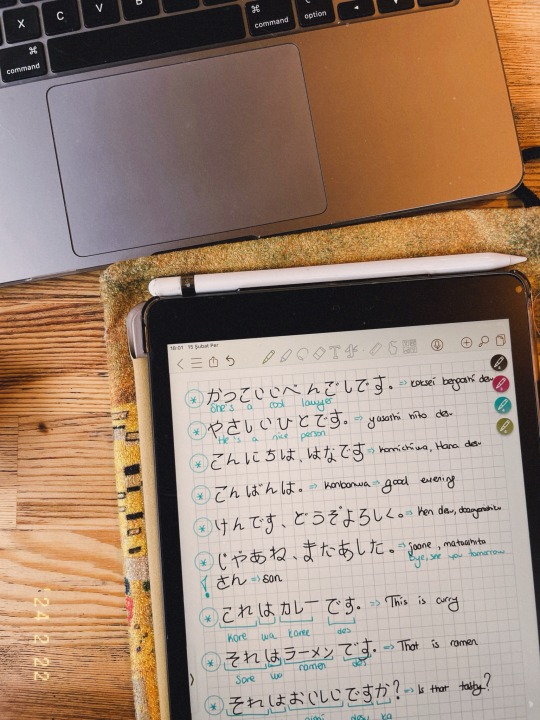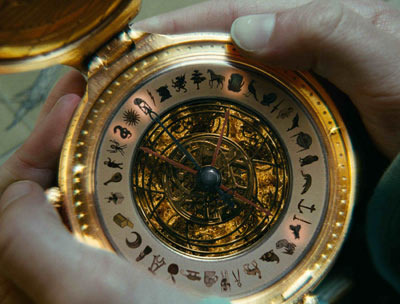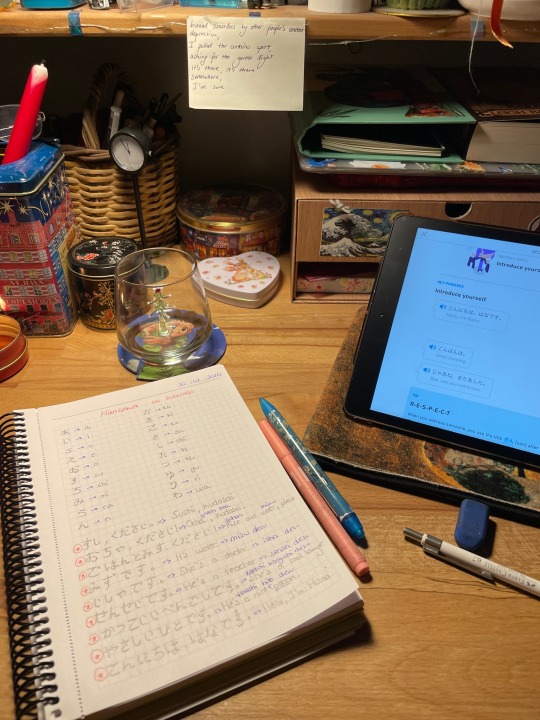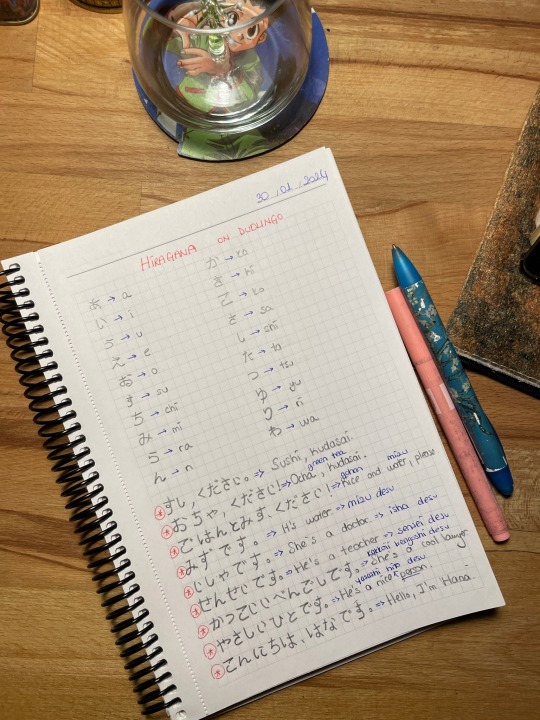#second language
Explore tagged Tumblr posts
Text
Transcript: "I have just been reading papers about how AAC is a second language, because of how it is learned, and because it has its own grammar and structure, also because it is part of a unique culture just like ASL is its own language with its own culture.
So congratulations to all my fellow second language learners. You are awesome!"
265 notes
·
View notes
Text
Has writing fanfiction helped you guys with your English?
Has writing fanfiction helped you guys with your English? (question to non-native English speakers).
I’m writing my MA thesis about the impact of writing fanfiction on English skills and proficiency, as well as on several individual differences.
Could you take some time to fill out my questionnaire? I would be forever grateful <3 It's a bit long, but I wanted to conduct a comprehensive study.
#fanfiction#fanfiction writing#non native english speaker#second language#english writing#writing in english#ma thesis#ma paper#research#fanfiction research#english fanfiction#fandom#help#writing help#english language#english grammar#linguistics#second language writing#non native English writers
225 notes
·
View notes
Text




learning japanese update: i’ve been practicing writing down sentences and trying to understand the sentence structure. linguistically, japanese and turkish have similarities, so i can say that it’s been going well and i’m having sooo much fun!!
#langblr#lunlunstudies#learning japanese#japanese learning#language lessons#second language#japanese language#language learning#language#langblog#studying#studyblr#studyspo#studystudystudy#study motivation
502 notes
·
View notes
Text

#english#esl#second language#language#lmao#humor#funniness#laughter#comedy#hilarious#funny moments#laughter therapy#humor therapy#smiles#laugh out loud
414 notes
·
View notes
Text
You know what I love about aftg the most? English is my second language, so when I read it goes like this:
Omg, I understand every word, how coo—
And then Andrew Minyard opens his mouth
Like guy talks exclusively with B2.5-C1+ vocabulary or whatever sounds gayer, I guess…
#aftg#all for the game#andrew minyard#kevin day#kevin day is the best boy to ever exist#neil josten#the sunshine court#english#second language
154 notes
·
View notes
Text
The Golden Compass of Our Linguistic Intuitions
From hakoret-harishona . com
October 30, 2018

One of Philip Pullman's loveliest ideas in his book The Golden Compass (1995) is an instrument called "an alethiometer". The alethiometer resembles a golden clock or compass, but instead of the hours in the clock, there are 36 little pictures – an anchor, an hourglass, a beehive and so on – around its rim. The instrument has three hands that can be arranged to point at any of the pictures, and a fourth, longer hand that can swing freely. The image above is a photo of the alethiometer from the film version of The Golden Compass.
The book's protagonist, a girl called Lyra, receives such an instrument, and later on hears an explanation regarding the origin of its name. The word alethiometer is derived from aletheia (ἀλήθεια), "truth" in Ancient Greek; an alethiometer is thus a "truth-meter".
"All these pictures round the rim … they're symbols, and each one stands for a whole series of things. Take the anchor, there. The first meaning of that is hope, because hope holds you fast like an anchor so you don't give way. The second meaning is steadfastness. The third meaning is snag, or prevention. The fourth meaning is the sea. And so on, down to ten, twelve, maybe a never-ending series of meanings … I know some, but to read it fully I'd need the book. I seen the book and I know where it is, but I en't got it. … You got three hands you can control … and you use them to ask a question. By pointing to three symbols you can ask any question you can imagine, because you've got so many levels of each one. Once you got your question framed, the other needle swings round and points to more symbols that give you the answer.'
'But how does it know what level you're a-thinking of when you set the question?'
'Ah, by itself it don't. It only works if the questioner holds the levels in their mind.'"
Choosing a Meaning
As a rule, then, the readers of the alethiometer use books to look up the relevant meanings of the symbols. Lyra doesn't have the books, and in any case, she's an uneducated child. However, as she plays around with the alethiometer, she soon realizes that without any books, she can read it, ask questions and understand the answers. The longer she uses the alethiometer, the better she gets at it. When asked "how do you know where these meanings are?" she answers "I kind of see 'em. Or feel 'em rather, like climbing down a ladder at night, you put your foot down and there's another rung. Well, I put my mind down and there's another meaning, and I kind of sense what it is. Then I put 'em all together."
I recently read Pullman's new book, a prequel to The Golden Compass. And as I read it, I realized that the alethiometer can be seen as a metaphor to the process of speaking, comprehending and even acquiring language.
Words, like the symbols in the alethiometer, have many meanings, often related. Some of them have dozens of meanings – as we can see by considering a few examples, or looking them up in a good dictionary. When we speak (or write), we must choose words that have meanings suitable to what we wish to say; when we decipher what has been said to us (or what we read), we must understand, like the readers of the alethiometer, which of a word's meanings is now relevant. Does since mean "from that time on" or "because"? Does wave indicate the rising of water, the movement of a hand, an oscillating electric field, or something that football fans do at a stadium? The relevant meaning of a word, like the relevant meaning of one of the alethiometer's symbols, is chosen or made clear by the complete message.
The process of choosing the relevant meaning happens when we phrase a message – speak, or ask a question of the alethiometer – as well as when we decipher one. In the quotation below, Lyra explains how she's asking the alethiometer "what's Mrs. Coulter doing now" (Mrs. Coulter is Lyra's mother).
"Well, the Madonna is Mrs. Coulter, and I think my mother when I put the hand there; and the ant is busy – that's easy, that's the top meaning; and the hourglass has got time in its meanings, and partway down there's now, and I just fix my mind on it."
Similarly, when we speak, we choose words that express the message we wish to deliver, i.e. words that one of their meanings suits what we wish to say. In the sentence "I called her but the line was busy", for example, there are several words with multiple meanings; if I say this sentence, I must have chosen called because one of its meanings is "phoned", and busy because one of its meanings is "currently in use". Once the message is created, we hope the person who receives it will decipher it correctly – will recognize, from among the different meanings of each word (or combination of words), the meaning we are trying to convey; that they, as Lyra put it, put their foot down and find another rung, put their mind down and find another meaning, and then put 'em all together.
So far it makes sense. Pullman's alethiometer can be seen as a metaphor, beautifully and poetically made, for symbolic communication. In the terms used by the linguist Ferdinand de Saussure, every sign is composed of a signifier and a signified; the alethiometer's symbols, like words in a language, are signifiers, and each one of them can, and indeed does, stand for several signified objects. Identifying the right meaning, in human communication as well as in reading the alethiometer, is a task that requires thought and an act of choosing.
How Many Levels? Perhaps a Never-Ending Series: Meanings, Register, Connotation, Context

Using words, however, entails much more than choosing one of several possible meanings. Words have not only meanings, but also a register: the words child and kid have a common meaning, but one is much less formal than the other. Words have not only a denotation, a primary and literal meaning, but also a connotation – the cultural and emotional associations that they carry with them; thin and slender have a similar meaning, but thin is basically neutral whereas slender has a positive connotation. Some words are commonly used in certain contexts, which can be very specific. Ginger is used to indicate a reddish color, but only for hair or fur (we wouldn't usually say "a ginger sunset"). Blonde is used even more specifically – only for hair: we say "a ginger cat", but we don't normally say "a blonde cat".
All these characteristics of words and their usage – the different meanings, the register, the connotations and the typical context – are somewhat similar to the "levels of meaning" in Pullman's alethiometer. There is the “first level” mentioned by Lyra, the level of the most common meaning, which will probably be the first meaning we learn as we acquire the language; but every word has multiple layers. This is most easily felt when someone uses a word in an unusual context or manner, or misinterprets a word when it is used to indicate a less common meaning. These kinds of mistakes are typical of non-native speakers – people who learned this particular language as second or third language, but have a different language as their native tongue.
The Alethiometer as a Mother Tongue
We thus reach another layer in Pullman's lovely metaphor. Most of the alethiometer's readers are scholars, meaning – adults. To them, using the alethiometer is a skill that requires learning, from books or from another scholar, and they need a book detailing the meanings of the symbols in order to phrase questions and comprehend the answers they receive. The child Lyra, on the other hand, acquires the ability to communicate with the alethiometer without requiring a book or a teacher. She toys with the alethiometer, looks at the pictures, moves the hands and follows the movement of the needle, and soon intuitively comprehends the meanings of the symbols: "I kind of see 'em. Or feel 'em rather". Her communication with the alethiometer is so fast and intuitive that this ability becomes a huge asset to her side in the war described in the book: by the time the enemy's adult reader has asked a question and deciphered the answer, her side has gained precious hours.
Does this difference remind you of something? I was reminded of the difference between mother-tongue and second-language acquisition. Children acquire their mother tongue easily and naturally, with no need for formal teaching or a dictionary. All it takes is for people to use it in their presence (and later – to talk to them). Adults, as a rule, require formal teaching. Even then, and after many years of practice, the second language is still a second language, and its deeper levels might still be missing, resulting in misunderstandings or peculiar phrasings.
Towards the conclusion of His Dark Materials trilogy, of which The Golden Compass is the first volume, Lyra has grown from a child to a young woman, and is horrified to realize that she has lost her ability to read the alethiometer. How did this happen? An angel explains to her that her ability to read the alethiometer has been given to her "by grace", and is now gone. Pullman does not explicitly indicate Lyra's growing up as the reason for this loss of grace, the ability to read the alethiometer intuitively; but she's told she can re-learn it "by work" – patiently, formally, with the use of books, and she decides to do so.
All of us, like Lyra, enjoy a period of grace in our childhood. One in which we can acquire a language effortlessly, just by hearing it. All of us, like Lyra, lose this ability as we grow up. Yet like Lyra, we can still learn a new language, and delve deeper and deeper into it, with hard work, patience and books.
#language#linguistics#philip pullman#his dark materials#the golden compass#hdm#writing#alethiometer#first language#mother tongue#second language#symbols#meaning#truth#words#communication#childrens literature#booklr#books#ya literature#native speaker#the book of dust#lyra#lyra silvertongue#lyra belacqua#long post#interesting#language learning#study#literature
43 notes
·
View notes
Text
I started learning German recently, and now I can't atop laughing at etvas etvas alias (something something alias). Jemand hilft mir! I need sleep!
#funny#memes#humor#meme#lol#haha#comedy#germany#duolingo#second language#new language#learning#learning a new language#learning german
24 notes
·
View notes
Text


Poor guy thinks he missed a few pages :(
#call of duty zombies#cod zombies#edward richtofen#call of duty#codz#cod#primis richtofen#codz fanart#primis crew#tank dempsey#primis dempsey#grammar police#english language#dislexia#second language
31 notes
·
View notes
Text
Can Togruta speak Lekku? Because they have head tails...
Do they have an own language with their head tails?
Could they learn Lekku?
Like as a second or third language?
#lekku is the language the twi'lek speak with the help of their lekkus#for everyone that doesn't know#other question completely but do Twi'lek use lekku as a for of sign language#when they are disabled#non verbal#or deaf#or When they can't openly talk#star wars#star wars questions#star wars thoughts#twi'lek#lekku#language#and#organ#waiting on my city train#star wars cultures#sorry for writing errors I write this on my phone#going to fix them later#I did fix all I could find now#not sure if I got all of them though#togruta#fictional language#non verbal communication#second language#third languages#non human#languages
19 notes
·
View notes
Text
o 625 words to know in your target language o
There is a really interesting blog called "Fluent Forever" that aids foreign language learners in tricks, tips and techniques to guide them to achieving fluency "quickly" and efficiently. One of the tricks is to learn these 625 vocab words in your target language, that way you have a basis to start delving into grammar with ease as you can understand a lot of vocab right off the bat. Plus this list of words are common across the world and will aid you in whatever language you are learning. Here is the list in thematic order
• Animal: dog, cat, fish, bird, cow, pig, mouse, horse, wing, animal
• Transportation: train, plane, car, truck, bicycle, bus, boat, ship, tire, gasoline, engine, (train) ticket, transportation
• Location: city, house, apartment, street/road, airport, train station, bridge hotel, restaurant, farm, court, school, office, room, town, university, club, bar, park, camp, store/shop, theater, library, hospital, church, market, country (USA,
France, etc.), building, ground, space (outer space), bank, location
• Clothing: hat, dress, suit, skirt, shirt, T-shirt, pants, shoes, pocket, coat, stain, clothing
• Color: red, green, blue (light/dark), yellow, brown, pink, orange, black, white, gray, color
• People: son, daughter, mother, father, parent (= mother/father), baby, man, woman, brother, sister, family, grandfather, grandmother, husband, wife, king, queen, president, neighbor, boy, girl, child (= boy/girl), adult (= man/woman), human (# animal), friend (Add a friend's name), victim, player, fan, crowd, person
• Job: Teacher, student, lawyer, doctor, patient, waiter, secretary, priest, police, army, soldier, artist, author, manager, reporter, actor, job
• Society: religion, heaven, hell, death, medicine, money, dollar, bill, marriage, wedding, team, race (ethnicity), sex (the act), sex (gender), murder, prison, technology, energy, war, peace, attack, election, magazine, newspaper, poison, gun, sport, race (sport), exercise, ball, game, price, contract, drug, sign, science, God
• Art. band, song, instrument (musical), music, movie, art
• Beverages: coffee, tea, wine, beer, juice, water, milk, beverage
• Food: egg, cheese, bread, soup, cake, chicken, pork, beef, apple, banana orange, lemon, corn, rice, oil, seed, knife, spoon, fork, plate, cup, breakfast, lunch, dinner, sugar, salt, bottle, food
• Home: table, chair, bed, dream, window, door, bedroom, kitchen, bathroom, pencil, pen, photograph, soap, book, page, key, paint, letter, note, wall, paper, floor, ceiling, roof, pool, lock, telephone, garden, yard, needle, bag, box, gift, card, ring, tool
• Electronics: clock, lamp, fan, cell phone, network, computer, program (computer), laptop, screen, camera, television, radio
• Body: head, neck, face, beard, hair, eye, mouth, lip, nose, tooth, ear, tear (drop), tongue, back, toe, finger, foot, hand, leg, arm, shoulder, heart, blood, brain, knee, sweat, disease, bone, voice, skin, body
• Nature: sea, ocean, river, mountain, rain, snow, tree, sun, moon, world, Earth, forest, sky, plant, wind, soil/earth, flower, valley, root, lake, star, grass, leaf, air, sand, beach, wave, fire, ice, island, hill, heat, nature
• Materials: glass, metal, plastic, wood, stone, diamond, clay, dust, gold, copper, silver, material
• Math/Measurements: meter, centimeter, kilogram, inch, foot, pound, half, circle, square, temperature, date, weight, edge, corner
• Misc Nouns: map, dot, consonant, vowel, light, sound, yes, no, piece, pain, injury, hole, image, pattern, noun, verb, adjective
• Directions: top, bottom, side, front, back, outside, inside, up, down, left, right, straight, north, south, east, west, direction
• Seasons: Summer, Spring, Winter, Fall, season
• Numbers: 0, 1, 2, 3, 4, 5, 6, 7, 8, 9, 10, 11, 12, 13, 14, 15, 16, 17, 18, 19, 20 21, 22, 30, 31, 32, 40, 41, 42, 50, 51, 52, 60, 61, 62, 70, 71, 72, 80, 81, 82, 90, 91, 92, 100, 101, 102, 110, 111, 1000, 1001, 10000, 100000, million, billion, 1st, 2nd, 3rd, 4th, 5th, number
• Months: January, February, March, April, May, June, July, August, September, October, November, December
• Days of the week: Monday, Tuesday, Wednesday, Thursday, Friday, Saturday, Sunday
• Time: year, month, week, day, hour, minute, second, morning, afternoon, evening, night, time
• Verbs: work, play, walk, run, drive, fly, swim, go, stop, follow, think, speak/say, eat, drink, kill, die, smile, laugh, cry, buy, pay, sell, shoot(a gun), learn, jump, smell, hear (a sound), listen (music), taste, touch, see (a bird), watch (TV), kiss, burn, melt, dig, explode, sit, stand, love, pass by, cut, fight, lie down, dance, sleep, wake up, sing, count, marry, pray, win, lose, mix/stir, bend, wash, cook, open, close, write, call, turn, build, teach, grow, draw, feed, catch, throw, clean, find, fall, push, pull, carry, break, wear, hang, shake, sign, beat, lift
• Adjectives: long, short (long), tall, short (vs tall), wide, narrow, big/large, small/little, slow, fast, hot, cold, warm, cool, new, old (new), young, old (young), weak, dead, alive, heavy, light (heavy), dark, light (dark), nuclear, famous
134 notes
·
View notes
Text
I don’t know any second languages, and that’s super embarrassing. I hate it, and I hate the Tennessee education system for letting it happen. So every time I see someone in my activity feed talking to me in English, while being from a non-English nation, my immediate reaction is feeling as if I’m in the presence of a deity.
Like someone comes into my notes and says “Yeah, I’m from Sweden and we have [long paragraph in English about thing they have]. I’m just immediately like:

#english#esl#second language#america#american#american education#languages#language#sweden#meme#memes
22 notes
·
View notes
Text

im learning my first second language i have a 50/50 chance of being able to communicate to the call operator enough to get emergency services to my location if i were ever injured in a spanish speaking country🥳🥳🥳
#into the spiderverse#language#languages#second language#language learning#peter b parker#miles morales#spiderman#spiderverse meme
236 notes
·
View notes
Text


so… i have been learning japanese!!! my german course will start in a couple of months and i’m excited to keep learning it, however learning japanese is in my 2024 goals :] since i started japanese dramas, i’ve been interested in the language. for now i am just learning from and practicing on duolingo. i’m looking for (and have found) some free online books and i’m gonna start studying using them as well. i don’t know why but it brings me so much joy when i remember words or build sentences with what i know. i really hope i can improve my japanese :]
#studying#studyblr#studyspo#studystudystudy#study motivation#study blog#studygram#student#studyinspo#lunlunstudies#language lessons#second language#language learning#language#japanese language#japanese langblr#japanese learning#langblr
169 notes
·
View notes
Text
if you are an intermediate or advanced language learner I highly recommend sitting in on/assisting with a beginner class for the entertainment value
like you have to have the humility to know you also made these mistakes early on and not be rude about it but also. it's peak fucking comedy.
anyway this post brought to you by my mongolian class today, where a classmate announced that he is an american swan
#or the asl class where a student asked me 'are you a hamburger' that was good too#language learning#second language#linguistics
30 notes
·
View notes
Text
Im encountering a problem with learning Spanish (besides it just being hard of course)
So I’m demifluid and use he/they/void pronouns. Now my gender identity does change and there are days where I identify more feminine or as neither masculine or feminine in terms of gender identity, but I am usually comfortable with he/they pronouns and swapping them up constantly is a hassle so I just stick with those.
This is usually fine because I don’t refer to myself in the third person very often, but it can cause issues if I’m, say, trying to write about myself in the third person or making a self-insert.
The reason why Spanish is an issue is because the grammar relies on the gender of the subject regardless of what perspective you’re speaking in and is mostly split between masc and femme terminology.
Not only does this mean it took me way longer to get a grasp on very basic grammar, but it also makes it much harder to just talk about myself without causing dysphoria. So far I’m just sticking with using masculine terms but it just doesn’t always feel right yk? It’s so easy in English, you just swap out the pronouns and the only one that messes with the grammar is they/them which just follows plural rules.
Idk man I’m sure I’ll figure something out, for now tho I’m just gonna focus on being able to communicate at all.
#ya boy rambles#learning spanish#second language#grammar#transgender#transmasc#non binary transmasc#nonbinary#he/they#neopronouns
13 notes
·
View notes